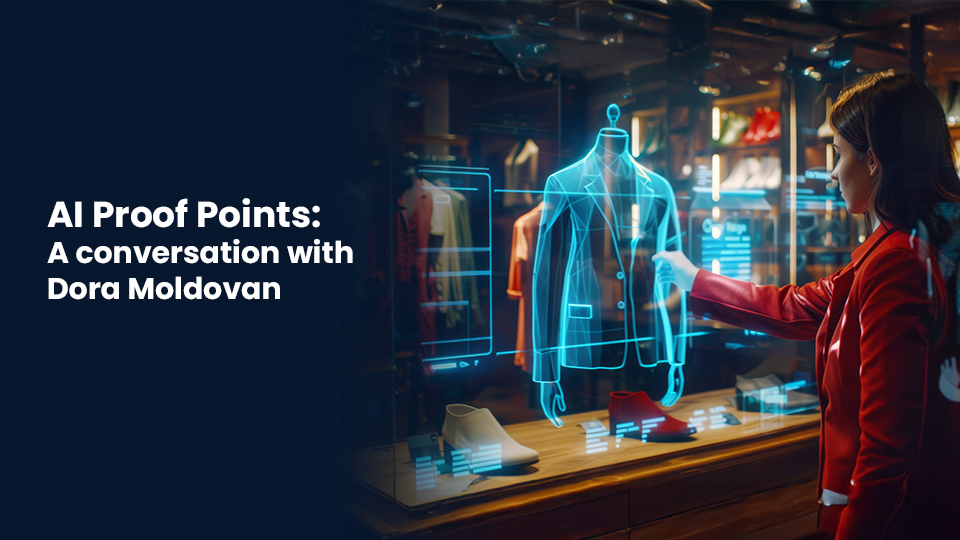Artificial intelligence (AI) is transforming nearly every industry. Retail is no exception.
AI Proof Points: a conversation with… is a new series that spotlights candid conversations with industry experts on all things AI and commerce. We’ll explore how AI, data, and social proof are rewriting the rules of modern commerce from discovery and personalisation to decision-making and conversion.
AI Is Reshaping Retail and eCommerce: it’s all about the data

To kick off the AI Proof Point series, we recently sat down with Dora Moldovan, Chief AI Officer at Tomorrow Group and founder of Braidr, a Global Data and AI Consultancy.
With a background in computer science and decades of experience leading data-driven innovation, Dora has been following AI’s evolution from the early 2000s — long before ChatGPT was a household name.
Below, is Dora’s take on the pace of AI adoption, what’s next for Agentic Commerce, and why the future of retail will belong to those who master their data.
Q: You worked in AI long before it became mainstream. How did you first get started in the field?
Dora Moldovan: I studied computer science back in 2002 — the “old ages,” as I like to call them. My university had two really in-depth AI courses, and I was completely hooked. I loved learning how agents could mimic human behaviour. It felt like science fiction come to life.
I even did my dissertation in AI, but back then, there wasn’t enough data or infrastructure to do much with it. So, I went into web development, then software engineering, and later built a data science team. Eventually, I launched Braidr, a Global Data and AI Consultancy. Today, as Chief AI Officer across the Tomorrow Group, I focus on driving AI adoption, how the agency shapes its services and how the industry perceives what we are doing.
Q: How do you use AI personally in your day-to-day work?
Moldovan: I don’t code anymore (if I did, I would use Claude), but I use AI every day. ChatGPT helps me shape ideas and structure presentations. But my favourite app right now is Gamma, which builds presentations from prompts. It’s reduced the time I spend creating slides by at least 70%. It’s fantastic.
Q: Which industries are leading in AI adoption?
Moldovan: It depends on two things: data maturity and leadership buy-in. Tech and finance are always ahead because they have strong data foundations and clear ROI models.
Ecommerce is catching up quickly for the same reason. It’s data-rich, well-structured and measurable. By contrast, heavily regulated industries such as healthcare and government are more cautious about AI adoption. AI thrives in spaces where data is clean and leaders are willing to experiment.
Q: Where would you place retail and eCommerce on that adoption curve?
Moldovan: Somewhere in the middle, but moving fast.
We’ve seen retailers use AI for years in personalisation, recommendations, and forecasting. Amazon’s been doing it forever. But what’s new is the scale and sophistication. AI is now running everything from merchandising planning to backend logistics to creative asset generation. But the next wave of AI adoption goes far beyond chatbots, recommendation engines and personalisation as we know it today.

We’re entering the age of Agentic Commerce, where consumers will not just search for products, but actually shop directly inside LLMs. That’s a huge shift.
Q: Where are retailers seeing the quickest ROI from AI?
Moldovan: Right now, the clearest ROI is in media buying and merchandising platforms.
Tasks that used to be extremely time-consuming and resource-intensive, such as creating and managing product feeds, are being automated. Meta even announced it’s aiming to fully automate advertising by 2026, from creative generation to campaign performance.
So, AI will make marketing cheaper, faster, and smarter. The opportunity is massive if you have the right data infrastructure.
Q: Speaking of data, you’ve said retailers need to rethink how they structure their data. What do you mean by that?
Moldovan: We’re entering an era of Generative Engine Optimisation or SEO for LLMs, if you will.
When consumers start shopping through AI assistants, those assistants rely on structured data rather than just web pages or traditional product feeds. That means your product feed and metadata matter more than ever. Retailers need to make sure their data is rich, well-structured, and retrievable by AI systems.
Traditionally, you worried about your website’s look and content. Now you have to care just as much about your product feed, because that’s how LLMs understand and recommend your products.
“Retailers that feed more accurate, well-structured data will win visibility in LLMs.”
Q: So first-party data becomes the differentiator?
Moldovan: Exactly. Retailers like ASOS or Selfridges may sell similar products, but what sets them apart is first-party data — who buys what, how often, and why.
That’s gold. And it can now be baked directly into product feeds. LLMs don’t limit how many attributes you can include, so retailers can add behavioural data: “preferred by Gen Z,” “bought frequently by repeat customers,” “trending in the Northeast.”
That’s powerful context that no one else has, and it’s what will help retailers stand out in AI-driven shopping environments.
Q: How does social proof fit into that equation?
Moldovan: Social proof is part of that first-party data story. It’s what gives your claims credibility. If an AI model sees that verified customers consistently buy or recommend a product, that becomes a trust signal. Retailers who can feed those signals into product data will have a huge advantage, because AI systems will surface their products as “best fit” results.
“AI can only move at the speed of your data quality. 2026 should start with a data audit — product feeds, attributes, images, everything.”
Q: Will Agentic Commerce really take off?

Moldovan: I think so, and faster than people expect. Look how quickly users adopted ChatGPT for search. OpenAI already has partnerships with PayPal, Shopify, Walmart, and Etsy, and it’s launched Agentic Commerce protocols so anyone can plug into its ecosystem. It’s moving quickly.
Sure, for big purchases or experiences, people will still want to buy from eCommerce sites and stores. But for everyday products, LLMs and AI shopping will be the fastest route. Amazon is already building its own AI shopping agent with Anthropic. Walmart’s doing the same. 2026 will be a big year for this shift.
Q: If you could give retailers one piece of advice, what would it be?
Moldovan: Start with your data. Audit your product information, clean up your feeds, enrich your attributes, improve your imagery and make sure it’s all structured and consistent.
Then, start optimising for how AI systems interpret and retrieve that information. Partner with platforms that can help you surface your products in LLMs.
There’s no excuse anymore for bad data or incomplete product info. AI can help you fix it, but it can’t work miracles if you feed it bad data. The retailers and brands that do that first will be the ones leading the next wave of eCommerce.
Key Takeaways
- AI adoption in retail is accelerating, especially in merchandising, media, and personalisation.
- Structured, high-quality product data is now critical for visibility in LLMs and Generative Search.
- First-party data and social proof will be key differentiators in the era of Agentic Commerce.
- Retailers must act now — audit data, invest in partnerships, and optimise for how AI systems “see” your products.
Want to learn how AI-powered conversion messaging solutions social proof and attribute messaging and dynamic badging are optimising conversion rate and creating more engaging shopping experiences for Debenhams, Steve Madden and many more retailers? Contact us today.


